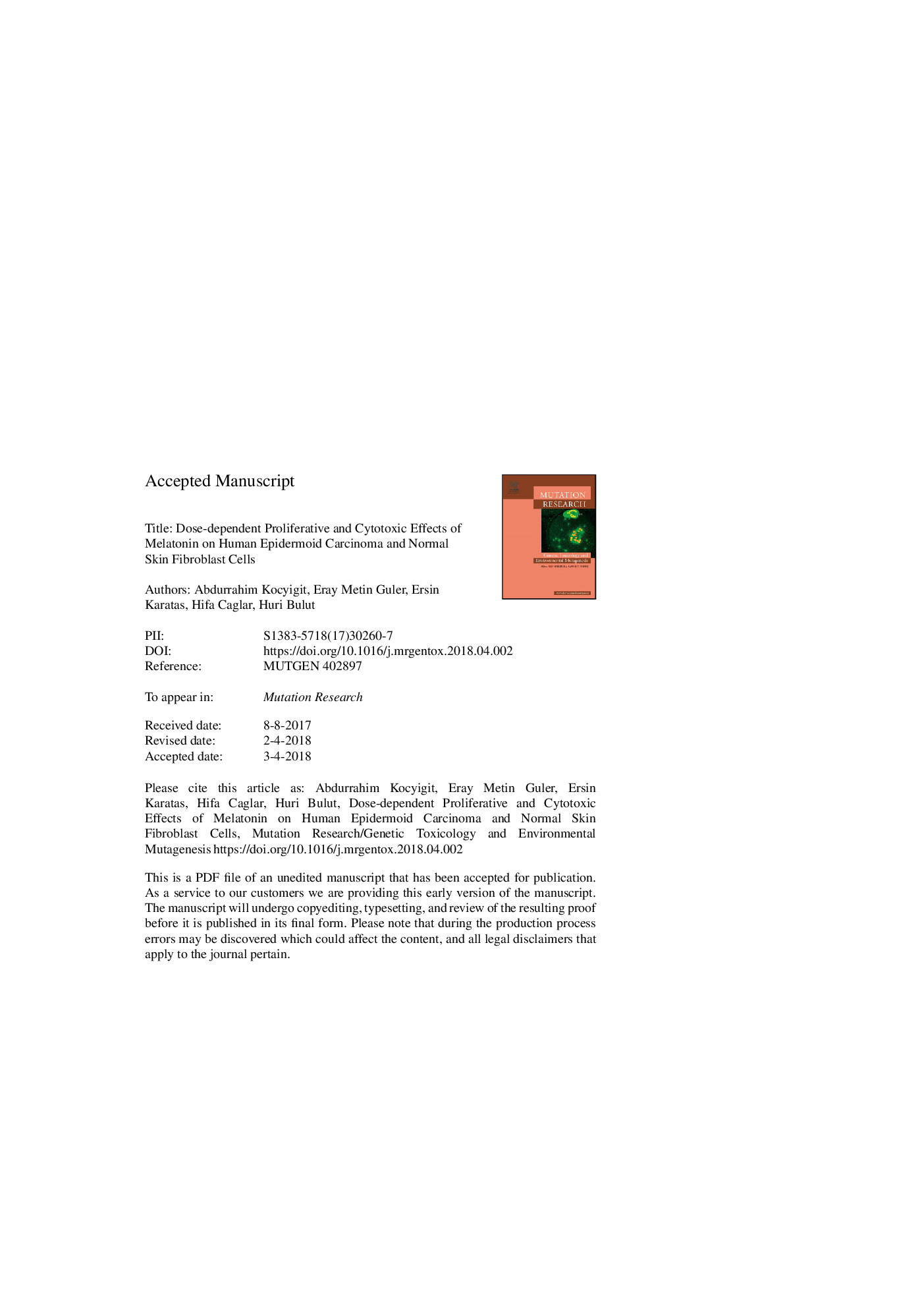| کد مقاله | کد نشریه | سال انتشار | مقاله انگلیسی | نسخه تمام متن |
|---|---|---|---|---|
| 8456203 | 1548542 | 2018 | 33 صفحه PDF | دانلود رایگان |
عنوان انگلیسی مقاله ISI
Dose-dependent proliferative and cytotoxic effects of melatonin on human epidermoid carcinoma and normal skin fibroblast cells
ترجمه فارسی عنوان
اثرات پرولیفراتیو و سیتوتوکسیک وابسته به دوز ملاتونین بر روی کارسینوم اپیدرموود انسان و سلول های فیبروبلاست پوست طبیعی
دانلود مقاله + سفارش ترجمه
دانلود مقاله ISI انگلیسی
رایگان برای ایرانیان
کلمات کلیدی
MMPPBSH2DCF-DADMEMFCSDAPIDiOC6(3) - DiOC6 (3)DMSO - DMSODulbecco’s modified Eagle medium - Modified Eagle اصلاح شده DulbeccoROS - ROSAcridine orange - آکاردین نارنجیethidium bromide - اتیدیوم برومایدApoptosis - خزان یاختهایDimethyl sulfoxide - دیمتیل سولفواکسیدPhosphate buffered saline - فسفات بافر شورMelatonin - ملاتونینReactive oxygen species - گونههای فعال اکسیژن
موضوعات مرتبط
علوم زیستی و بیوفناوری
بیوشیمی، ژنتیک و زیست شناسی مولکولی
تحقیقات سرطان
چکیده انگلیسی
New in vitro studies have demonstrated that N-acetyl-5-methoxytryptamine (Melatonin) has cytotoxic and apoptotic effects on various cell types although most of the previous investigations document that it is a potent antioxidant. However, the precise molecular mechanism(s) of its effects are not fully elucidated. In this study, we examined dose-dependent cytotoxic, genotoxic, apoptotic and reactive oxygen species (ROS) generating effects of melatonin in human epidermoid carcinoma cells (A-431) and human normal skin fibroblastic cells (CCD-1079Sk). The cells were incubated with different doses of melatonin (0.031-5â¯mM) for 24â¯h. Cell viability was assessed based on luminometric ATP cell viability assay. Intracellular ROS was detected using 2,7-dichlorodihydrofluorescein-diacetate (H2DCF-DA) fluorescent probes. Genotoxicity was evaluated by alkaline single cell gel electrophoresis assay (Comet Assay). Apoptosis was evaluated by western blotting, DAPI staining, acridine orange/ethidium bromide and Annexin VâFITC/propidium iodide double staining methods Mitochondrial membrane potentials were measured by flow cytometry. Although lower doses of melatonin (0.031-0.06â¯mM) increased cell proliferation and decreased ROS generation, higher doses (0.125-5â¯mM) markedly inhibited the cell viability, induced DNA damage, apoptosis and ROS generation. Cytotoxic, genotoxic, apoptotic and ROS generating effects were significantly higher in cancer cells than those observed in normal cells. Melatonin-induced cell death, and ROS generating activity were effectively inhibited by N-acetyl-l-cysteine (NAC) In conclusion, at low doses, melatonin has proliferative effects on both cancer and normal cells, whereas high concentrations have cytotoxic effects. Cytotoxic, genotoxic and apoptotic effects at higher doses of melatonin may be due to its ROS production capacity.
ناشر
Database: Elsevier - ScienceDirect (ساینس دایرکت)
Journal: Mutation Research/Genetic Toxicology and Environmental Mutagenesis - Volumes 829â830, MayâJune 2018, Pages 50-60
Journal: Mutation Research/Genetic Toxicology and Environmental Mutagenesis - Volumes 829â830, MayâJune 2018, Pages 50-60
نویسندگان
Abdurrahim Kocyigit, Eray Metin Guler, Ersin Karatas, Hifa Caglar, Huri Bulut,
